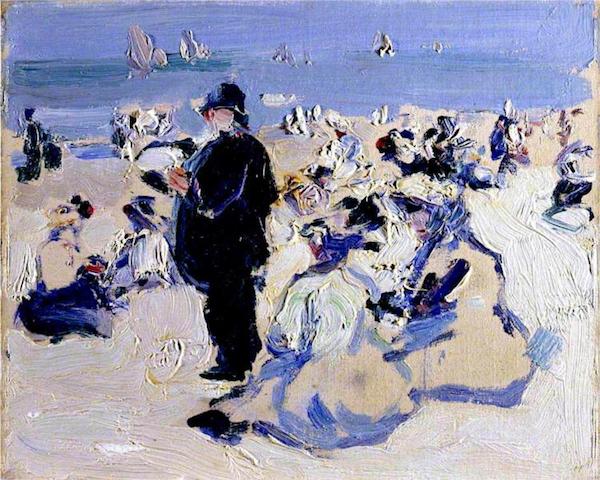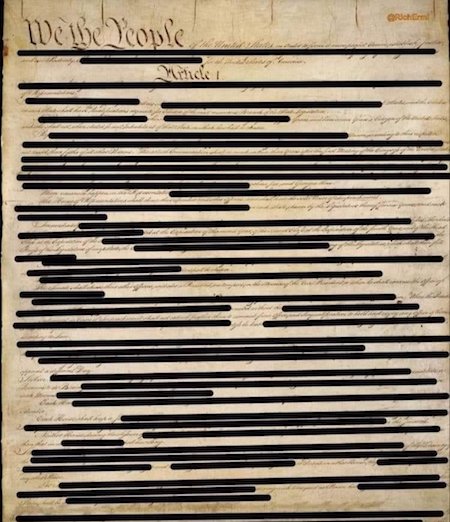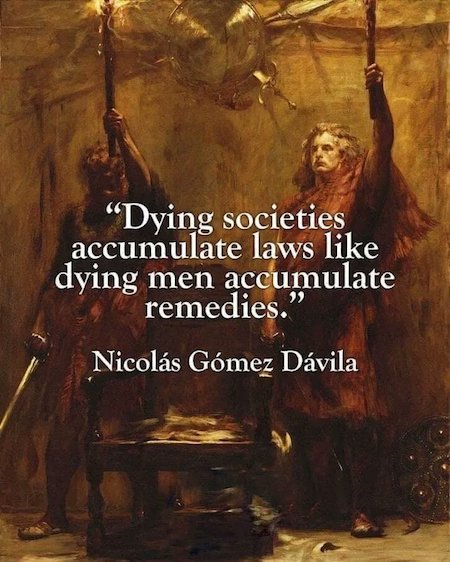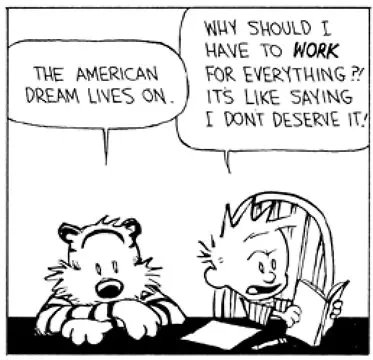
Samuel Peploe Beach scene 1907



Covid theater
— Wittgenstein (@backtolife_2023) August 28, 2022



Dark Brandon
https://twitter.com/i/status/1563414040897998848


Situation under control

Ages of companies:
Twitter: 16 years
Facebook: 18 years
Tesla: 19 years
Google: 24 years
Netflix: 25 years
Amazon: 28 years
Apple: 46 years
Microsoft: 47 years
Sony: 76 years
Samsung: 84 years
Boeing: 106 years
IBM: 111 years
Nintendo: 133 years
Nokia: 157 years


If you were doubting they are creating a “you have nothing” society that needs to be built back better, then ask yourself why Europe doesn’t support its fertilizer industry. The consequences are clear enough. And sure, there’s the nitrogen narrative. But closing down both farmers and ammonia plants will lead to a civil war of sorts. Your leaders think they can win that. I’m not so sure.
• Wave Of European Ammonia Plant Closures To Exacerbate Food Crisis (ZH)
A wave of European ammonia-plant shutdowns due to soaring natural gas prices has resulted in a devastating fertilizer crunch, worsening by the week, with as much as 70% of production offline. “Ammonia prices, though volatile, rose 15% in 3Q and could climb higher as Europe’s record gas prices curtail output and send ammonia producers to the global market in search of replacement supplies to run upgrade facilities — with winter still around the corner,” Bloomberg Intelligence’s Alexis Maxwell wrote in a note. As of Friday, 70% of capacity is offline across the continent, according to Fertilizers Europe, representing top regional producers.
“The current crisis begs for a swift and decisive action from EU and national policymakers for both energy and fertilizer market,” Jacob Hansen, director general of Fertilizers Europe, said in a statement.” Producers from Norway’s Yara International ASA to CF Industries to Borealis AG recently reduced or halted production because European NatGas prices hit a record high of 343 euros per megawatt hour, making it uneconomical to operate. “We confirm we are reducing and stopping production of some fertilizer plants in the different EU sites and this for economic reasons,” a spokesperson for Borealis AG said.”
Europe’s benchmark NatGas price soared nearly a third this week as Russian supplies to Europe via Nord Stream 1 pipeline have been reduced to 20% over the summer and face a temporary halt on Aug. 31 for three days. The region’s fertilizer industry association warned the energy crisis is rippling across many industries and could heavily impact the food industry. “We are extremely concerned that as prices of natural gas keep increasing, more plants in Europe will be forced to close. “This will switch the EU from being a key exporter to an importer, putting more pressure on fertilizer prices and consequently affecting the next planting season,” said Maximo Torero, chief economist at the United Nations Food and Agriculture Organization.

Stop the sanctions, negotiate for peace, and you can have all the oil you want. Blaming this on Russia is just a stupid story.
• Russia Can Afford Complete Halt In Gas Supplies To Europe – Bloomberg (RT)
Russia can shut down its natural gas exports to Europe entirely for more than a year, without inflicting significant damage on the national economy, Bloomberg has reported, citing strategists at Capital Economics. In light of the current price situation, Russia’s “balance of payments is in such a strong position that, if oil prices and oil exports remain at current levels, Russia could keep gas exports to Europe at 20% of normal levels for at least three years,” analysts at the consultancy said in a note seen by the agency. A year-long supply cut-off by Russia could happen “without adverse consequences for its economy,” Liam Peach, one of the economists at Capital Economic said. sAccording to Peach, despite reduced volumes, Russia’s quarterly earnings generated by gas exports could amount to $20 billion.
“Whether or not Russia turns off the taps completely will be a political decision and the length of any cut-off would depend on the size of offsetting oil revenues,” Peach said. Several European leaders have repeatedly accused Moscow of using gas as a weapon of political pressure, with the Kremlin rejecting the allegation. The latest technical problems with Nord Stream 1 pipeline, a key gas route from Russia to Europe, prompted Gazprom to slash deliveries, sending prices skyrocketing. Another major test for the market is expected to arise next week, when the energy giant halts gas flows through Nord Stream 1 for three days due for maintenance work, starting on August 31.
Chomsky Unprovoked
Noam Chomsky says the war in Ukraine was "massively provoked"pic.twitter.com/TDpzW8bIpx
— Hassan Mafi (@thatdayin1992) August 28, 2022

Waiting for the next country to “fall out of line”. Not much time left.
• Hungary Says It ‘Won’t Even Negotiate’ Energy Sanctions On Russia (RT)
Budapest refuses to negotiate any further EU restrictions targeting Russian energy because there is no current alternative to supplies from Moscow, Hungarian Foreign Minister Peter Szijjarto said on Saturday. The EU has slapped several rounds of sanctions on Moscow in response to the conflict in Ukraine, and is pushing for a complete phasing-out of energy supplies from Russia. “We’re not even willing to negotiate any sanctions on energy, be it oil or gas,” Szijjarto said at an economic forum in Tihany, adding that “the courage of the Hungarian government” has helped Budapest to withstand pressure from Brussels.
“There is no security of energy supply to Europe without using Russian sources,” Szijjarto stated, arguing that Russian gas cannot be replaced in the foreseeable future. The foreign minister added that the “largely misguided sanctions response” to Russia’s military campaign is one of the factors driving up inflation and contributing to a global recession.Hungary, whose economy is heavily dependent on oil and gas from Russia, was exempted from an EU-wide ban on Russian crude in May. The bloc banned the import of oil by sea, but Hungary continues to receive the commodity via a pipeline. Hungarian Prime Minister Viktor Orban said last month that Europe has “shot itself in the lungs”with its ill-considered sanctions against Russia.

“..the European people are being positioned to face the consequences while being told there will be no consequences..”
• The Real World Consequences Of Europe’s Coming Energy Crisis (ZH)
The IEA is an institution that is hostile to carbon based energy and industries and calls for the end of all carbon emissions by 2050. This is why none of their bullet points from March that have been attempted have worked; because they aren’t designed to work, only promote further carbon controls while harming global power generation in the process. There are currently no practical replacements for oil, coal and natural gas; none. Especially not in a reasonable time frame that would spare Europeans from a full blown disaster. The only way green technology would be able to provide enough energy for the world’s populations would be if the human population was greatly reduced. Europe’s energy crisis actually helps the IEA agenda, just as it helps the UN and WEF climate agendas. But what about all the people that will suffer in the meantime?
Expect to see extensive energy rationing this winter in the EU. Around 80% of all EU natural gas is imported and Russia’s natural gas exports make up around 40% of Europe’s heating and electricity. With Russia now reducing exports down to 20% of their original levels, there is zero chance that the EU will be able to maintain their normal energy usage. Supply-side shortages will mean a price explosion going into winter as demand increases. Prices have the potential to double (or more) by the beginning of 2023. European governments will likely prioritize heating for public homes over energy for industry; they will do this to prevent civil unrest, as some government officials are already warning about. There is a chance that EU industry will be hobbled as energy supplies are rerouted for public consumption. We have seen something similar to this in China this year as their drought conditions worsen.
Civil unrest will probably happen anyway. Climate restrictions, green energy rules on carbon emissions and other ludicrous measures are making it impossible for Europeans to adapt to crisis events. Prices will be high, and price caps won’t help with supply shortages. When people start to freeze, there will be anger and desperation. The only legitimate short term solution to prevent a historic energy calamity in the EU this winter would be to remove sanctions on Russia. But, NATO has made it clear that this will not happen. So, the European people are being positioned to face the consequences while being told there will be no consequences. And, when the pain starts to hit, they will be told that it’s all for the “greater good.”

Actually, we do.
• You Have No Idea How Bad Europe’s Energy Crisis Is (FP)
Normally, Europe can refill its gas storage during the summer and coast in the winter, when usage is higher. Now, with colder months looming and Russia’s tightening chokehold on natural gas flows, Europe has been locked in a race against time to fill its tanks, which leaders have stocked by paying eye-watering prices. So far, experts said, European nations have been largely on track with their plans—but that doesn’t mean that they will be out of the woods come winter. In the winter, Europe typically “uses a lot of what it has in storage while, at the same time, importing lots of gas from other sources,” Munton said. “It needs both. But as we think about this winter, there is a very real threat that there won’t be any Russian gas at all.” In normal times, Russian gas supplies about 40 percent of European imports.
Without Russia’s supply in the winter, Munton added, European nations will be forced to rely on imports of liquefied natural gas (LNG) even more from suppliers such as the United States. The problem is that Asia—a larger LNG market—is also vying for the same supplies, which means prices are always going to be higher than old piped gas from the East. “That’s really the crisis that Europe and the world confronts,” he added. As Europe abandons Moscow’s energy supply, many leaders have rushed to secure alternative deals and supplies with other countries. Italy has secured more gas from Algeria while other nations have turned to Azerbaijan, Norway, and Qatar.
Germany has also expressed its hopes for a new LNG deal with Canada, which in turn has been considerably less optimistic. Others have invested considerably more into LNG infrastructure, with Germany racing to build five floating LNG terminals and the Netherlands, Finland, and Italy all preparing for more floating units to import gas. But in the immediate future, energy experts said there is only so much that countries can do to shore up their supplies. “There’s a limit to what you can do in the near term to bring additional supplies into Europe because there’s only so much LNG in the world,” said Jason Bordoff, founding director of Columbia University’s Center on Global Energy Policy and a former special assistant to former U.S. President Barack Obama.

The 10-year war scenario. Question: will Putin tolerate that? I don’t see it.
• Germany Vows To Support Ukraine ‘For Years’ (RT)
The conflict between Ukraine and Russia could “could go on for years”, but Berlin will keep supporting Kiev all the way, Germany’s Foreign Minister Annalena Baerbock has said. “Unfortunately, we have to assume that Ukraine will still need new heavy weapons from its friends next summer,” Baerbock told the Bild tabloid on Sunday. “Ukraine is also defending our freedom, our peace,” the minister said, adding that Berlin will support Kiev “financially and militarily — and for as long as it is necessary, full stop!” Baerbock’s pledge comes despite her admission earlier this week that Germany’s military is facing an “absolute deficit” of hardware, due to arms shipments to Ukraine. Berlin has so far supplied artillery pieces, shoulder-fired rockets and anti-aircraft self-propelled guns to Ukraine.
Nevertheless, German Chancellor Olaf Scholz has faced criticism throughout the six months of the conflict, for his apparent reluctance to send more sophisticated weaponry to Kiev. Baerbock said on Wednesday that Germany’s Iris-T anti-aircraft missile system will be sent to Ukraine in the coming weeks, and that more deliveries should be expected by the end of the year. In her interview with Bild, the diplomat pledged to “cushion the social imbalances resulting from high energy prices” in Germany, caused by a drop in deliveries of Russian gas to Europe, amid sanctions against Moscow. Baerbock also defended Ukraine’s claim to Crimea, which overwhelmingly voted to reunite with Russia in a referendum in 2014. “Crimea also belongs to Ukraine. The world has never recognized the annexation of 2014, which was against international law,” the Green party politician claimed.
Lord Dannatt
"The military commanders have got to advise, Look, Mr. President, we have done as much as we can, but we really can’t throw the Russians out."
Lord Richard Dannatt tells #TimesRadio that President Zelensky should ‘start negotiating’ as ‘Russia is not going to lose.’ pic.twitter.com/ENeNABRzvJ
— Times Radio (@TimesRadio) August 24, 2022

Oh-oh.
• Britain’s Financial Support For Ukraine To Run Out By New Year – Times (RT)
The UK’s financial support for Ukraine’s military will run dry by the end of the year, a Defense Ministry source has told the Sunday Times. London has already given Kiev more than £2.3 billion ($2.7 billion) in military aid, but whoever leads the country next will have to deal with strained public finances and declining public enthusiasm for a protracted conflict. British Prime Minister Boris Johnson visited Kiev last week, where he announced a new package of military aid to Ukraine worth £54 million ($63 million), on top of the £2.3 billion committed by the UK since Russia’s military operation began in February. Johnson promised to support Kiev’s military for “however long it takes,” and his likely successor, Foreign Secretary Liz Truss, is known for her even more hawkish stance toward Russia.
“The reality, as one Ministry of Defence source acknowledged, is that the UK’s financial contribution to the war effort will have dried up by the end of the year,” the Sunday Times article noted. “This means that the new prime minister will very soon face the question of whether to commit billions of pounds of additional support at a time when the public finances are under intense strain.” Britain is currently grappling with soaring inflation – predicted to hit 18% in early 2023 – and record fuel prices. Driven by market forces, supply disruption due to the conflict in Ukraine, and Britain’s decision to cut off its energy imports from Russia, much of this price hike is being passed on to consumers, with energy regulator Ofgem raising the energy price cap on Friday by 80%. This move will see the average household pay more than £3,500 per year in energy bills.

Victims of failed western policies.
• 50,000 Ukrainian Refugees Face Homelessness In UK (RT)
Some 50,000 Ukrainians could be homeless in the UK next year, as the government’s scheme to match refugees with British families breaks down, The Guardian reported on Sunday. With the cost of living spiraling, the opposition wants the government to boost payments to host families. Analysis by the Labour Party, the Liberal Democrats and children’s charity Barnardos found that, based on feedback from British hosts, between 15,000 and 21,000 Ukrainians could be homeless by the winter, rising to more than 50,000 by mid-2023, the newspaper reported. To date, 83,900 refugees have arrived in the UK since March under the government’s Homes for Ukraine scheme, under which British households are paid £350 ($411) per month to house refugees for six months.
However, as of earlier this month, 1,330 Ukrainian households in England – 385 single refugees and 945 families with children – have left the scheme and are now homeless. It is unclear why these matches did not work out, but campaigners told The Guardian that some hosts signed up enthusiastically without understanding “the implications and consequences of this sort of responsibility,”while others are finding that due to the rising cost of living in the UK, £350 per month is no longer sufficient to support new additions to the household. A further wave of homelessness is expected from September onwards, when most of the six-month sponsorship agreements expire.
Minister of State for Refugees Lord Harrington has lobbied the Treasury to double monthly payments for those who can host refugees for more than six months, but the government has given no indication that it will act on his recommendations, and Harrington has taken to pleading with British households to join the scheme. However, while some of the activists who spoke to The Guardian said the impending crisis could be averted with more financial support from the government, a majority of sponsors aren’t motivated by money. According to a recent government survey, only a quarter of those quitting the scheme after six months said they were doing so because they could no longer afford to take part, and just four in ten said that more money would encourage them to extend their participation. A majority (58%) said they only ever intended to provide short-term accommodation. sYet Ukrainian refugees arriving in Britain under the scheme have been given visas for three years.

Simon Tisdall in the Guardian. Does he really see things this way?
• Putin Is Trapped And Desperate. Will His Friends In The West Rescue Him? (G.)
The mass of men lead lives of quiet desperation.” So wrote American author Henry David Thoreau in 1854. It’s a fate that is rapidly overtaking Vladimir Putin as he struggles to escape the disastrous trap he set for himself in Ukraine. Russia’s president keeps understandably schtum about his “special military operation”. But indefinite stalemate is not what he expected. He didn’t expect car bombs in Moscow and humiliating attacks on fortress Crimea, either. Least of all did Putin anticipate 80,000 Russian soldiers dead or wounded. Dying with them is his Peter the Great pipe dream of a “greater Russia”. Extinct already is his reputation as anything other than a killer and a crook. An endless military quagmire is not a scenario Putin can afford as slow-burn western sanctions corrode his economy and his military’s manpower and materiel are steadily depleted.
So what are his options? He could declare a specious victory, claim the Nato “threat” is neutralised and propose a settlement recognising Russia’s annexation of occupied areas. But he surely knows Kyiv will never willingly accept such terms. He could gamble on a huge battlefield escalation, for example, using Belarus to open a second front north of Kyiv – the region he failed to overrun in February. But it’s uncertain his generals have the capability or the stomach. He certainly dare not retreat. So as pressure on him grows to produce a breakthrough, Putin may well decide his best option is to raise the cost of the war to Ukraine’s backers – and undermine Kyiv’s resistance that way. In fact, he has already begun. It’s telling that British, French and German leaders all proclaimed long-term support for Ukraine last week. They know Putin is betting they will buckle.
The context is rising anxiety over Europe’s energy and cost of living crises, largely caused by the invasion and Kremlin cuts to gas supplies. The winter fallout from this coldest of cold wars could prove paralysing. Yet Putin may just be getting started. He has many means by which to undermine western unity and staying power. Europe is littered with easily exploited potential flashpoints and geopolitical faultlines bequeathed from Soviet times. Likewise, Russia has surprising numbers of allies and sympathisers scattered across a politically fractured European landscape. So will Putin’s friends in the west help rescue the beast from the east? Belarus’s Alexander Lukashenko is already in Putin’s pocket. Moscow ensured the dictator survived after his theft of the 2020 presidential election provoked nationwide protests. Lukashenko will do as he’s told.
Inside the EU, Viktor Orbán, Hungary’s prime minister, is seen as Putin’s Trojan horse. Like many on Europe’s far right, Orbán admires his intolerant nationalist ideology and shares his racist, homophobic outlook. He has repeatedly obstructed EU sanctions. Last month he cut a unilateral gas deal with the Kremlin. Orbán plainly cannot be trusted.

Imagine the pressure on these people.
• IAEA Assembles Team For Zaporozhye Nuclear Plant (RT)
The UN’s International Atomic Energy Agency (IAEA) has cobbled together a team of independent experts to visit Ukraine’s Zaporozhye nuclear power plant, which is now under Russia’s control, the New York Times reported on Saturday. The plant and the nearby city of Energodar have been repeatedly shelled by Kiev’s forces in recent weeks. According to the outlet, the members of the delegation include Rafael Mariano Grossi, the IAEA chief, and 13 other experts from “mostly neutral countries.” The report also reveals that neither the US nor Britain have any representatives on the team, given that Russia had dismissed those countries as “unfairly biased” over their support for the government in Kiev.
The NYT report says the IAEA mission includes experts from Poland and Lithuania, countries that support Ukraine, but also others from Serbia and China, which have much warmer relations with Russia. A number of delegation members also come from Albania, France, Italy, Jordan, Mexico, and North Macedonia. The goal of the mission, according to Grossi, is to see what exactly is happening at the plant, inspect its integrity, speak to both Russian and Ukrainian staff there, and establish a permanent presence on the ground. The move follows a phone call between Russian President Vladimir Putin and his French counterpart Emmanuel Macron last week, during which the two leaders agreed on dispatching an international mission to the area “as soon as possible.”
The team will apparently travel on terms arranged by Ukraine and the United Nations, which means the experts will arrive at Zaporozhye via territory currently controlled by Kiev’s forces. Moscow had previously insisted that such a mission should arrive only via Russian-controlled territory. Moscow has repeatedly accused Ukrainian forces of attacking the nuclear plant, while warning that the shelling could trigger a disaster that would eclipse the 1986 Chernobyl incident. At the same time, Kiev insists that it is Russian forces who are shelling the site while stationing military hardware there.

When will Russia take out the offices of Ukraine intelligence?
• Ukraine Relying On US-developed Blueprint To Fight Russia – CNN (RT)
During its conflict with Russia, Ukraine has been relying on a US-developed doctrine that involves both the military and civilians taking part in defensive activities, CNN reported on Saturday. The Resistance Operating Concept (ROC), which is said to provide a blueprint for smaller states to counter larger powers, was developed in 2013 in response to Russia’s conflict with Georgia in 2008. It was further enhanced after Crimea’s “nearly bloodless” reunification with Moscow in 2014, which “stunned Ukraine and the West,” CNN said. The ROC represents “an innovative and unconventional approach to warfare and total defense,” and guides the actions not only of the Ukrainian military, but also the civilian population.
“It’s all hands on deck in terms of the comprehensive defense for the government of Ukraine,” explained retired Lt. Gen. Mark Schwartz, who was in charge of Special Operations Command Europe during the development of the concept. “They’re using every resource and they’re also using some highly unconventional means by which to disrupt the Russian Federation military.” Schwartz said it was “just incredible to watch… despite the unbelievable loss of life and sacrifice, what the will to resist and the resolve to resist can do.” Explosions at Russia’s military facilities in Crimea – far from the front line in Donbass – earlier in August were signs that the ROC had been in play, claimed Kevin D. Stringer, a retired army colonel who led the development team for the concept.
Kiev never officially confirmed its involvement in the incidents, but CNN said it saw a Ukrainian government report confirming that it was behind them. Russia said the blasts at its Saki airfield in western Crimea were the result of an accident, while an ammunition depot in the north of the peninsula had been targeted in an “act of sabotage.” “Since you can’t do it conventionally, you would use special operations forces, and those [forces] would need resistance support – intelligence, resources, logistics – in order to access these regions,” Stringer said, explaining the alleged actions by Kiev. Civilian resistance under the ROC includes nonviolent actions such as boycotting public events, labor strikes, and even using satire and jokes as means of resistance. Violent actions, like using Molotov cocktails, arson and putting chemicals in gas tanks to sabotage enemy vehicles, are also part of the concept.
Generally, the doctrine calls for a major PR campaign to control the narrative of the conflict, preventing the dissemination of the other side’s message, and keeping the population united. Video footage showing destroyed Russian hardware and edited to catchy tunes forms part of the strategy, along with clips of Ukrainian troops rescuing stray animals, and daily addresses by Ukrainian President Vladimir Zelensky – “whether intentional or not,” CNN claimed. At least 15 countries have taken part in some form of training on the Pentagon’s resistance doctrine over the past decade, Nicole Kirschmann, a spokeswoman for Special Operations Command Europe, revealed. The program isn’t universal. It’s being tailored in accordance with each country’s population, resources and terrain. CNN’s report mentioned Estonia, Lithuania and Poland as nations that have expressed enthusiasm for the ROC.

“The Kremlin also expressed hope at the time that “common sense” would eventually prevail.”
• EU To Suspend Visa Deal With Russia – FT (RT)
EU foreign ministers plan to back a suspension of the 2007 EU-Russia visa facilitation deal at a two-day meeting in Prague, next week, the Financial Times reported on Sunday, citing three officials familiar with the matter. In response to Moscow’s military operation in Ukraine, several member states have actively been lobbying for either a ban or heavy restrictions on the number of Russian citizens entering the bloc. “It is inappropriate for Russian tourists to stroll in our cities, on our marinas,” a senior EU official told the newspaper. “We have to send a signal to the Russian population that this war is not OK, it is not acceptable.” The suspension of the agreement would make the process of applying for all EU visas more complicated and expensive, as well as increasing waiting times.
“We are in an exceptional situation and it requires exceptional steps. We want to go beyond suspending the visa facilitation,” an EU official was quoted as saying. The official stated that additional restrictions could be adopted by the end of the year, according to the FT. Countries such as Poland, the Czech Republic, Estonia and Latvia have already stopped issuing visas to Russian citizens. Estonian Prime Minister Kaja Kallas said this week that Russian tourists pose a security threat to the country, and that a travel ban could incentivize some Russians to “pressure” the Kremlin. Others, including German Chancellor Olaf Scholz and the EU’s top diplomat Josep Borrell, spoke out against a full ban on Russian travelers. They argued that the bloc should not punish ordinary Russians for the actions of their government. Moscow blasted the proposed measures as “flagrant nationalism” and xenophobia. The Kremlin also expressed hope at the time that “common sense” would eventually prevail.

“..January 6 Committee, which hauled witnesses before the cameras to give hearsay testimony.”
• New York Times Calls For Merrick Garland To Indict Donald Trump (PM)
The New York Times Editorial Board has called for the Biden administration’s Department of Justice to prosecute former President Donald Trump. The crimes of which he’s accused have not yet been fully elucidated, due to a heavily redacted affidavit, provided under duress by the DOJ to explain why a search warrant was approved for an FBI raid of Trump’s Mar-a-Lago residence. The Times asserts that the “nation has been transfixed” by the overly produced, prime time hearings of the essentially partisan, Democrat-run January 6 Committee, which hauled witnesses before the cameras to give hearsay testimony.
The DOJ’s seeking of a search warrant to raid Trump’s home was not connected to any charges that may be brought by that Committee. The DOJ is seeking criminal charges against the former president for how he handled documents, while the January 6 Committee is searching for evidence that Trump was involved in planning the riot at the Capitol that occurred on that day in 2021 The Times asserts that there is no question as whether or not Trump spurred on an angry mob to enter the Capitol, saying that “When all else failed,” in his political redress to seek potential election improprieties, “he roused an armed mob that stormed the Capitol and threatened lawmakers.”
The results of the January 6 Committee, they say, is that “Mr. Trump must have known he was at the center of a frantic, sprawling and knowingly fraudulent effort that led directly to the Capitol siege. For hours, Mr. Trump refused to call off the mob.” They further encourage Attorney General Merrick Garland to seek an indictment against Trump, saying “If Attorney General Merrick Garland and his staff conclude that there is sufficient evidence to establish Mr. Trump’s guilt on a serious charge in a court of law, then they must seek an indictment too.” What the Times asserts is that “If Mr. Garland decides to pursue prosecution, a message that the Justice Department must send early and often is that even if Mr. Trump genuinely believed, as he claimed, that the election had been marred by fraud, his schemes to interfere in the certification of the vote would still be crimes.

Kevin R. Brock is a former assistant director of intelligence for the FBI and principal deputy director of the National Counterterrorism Center (NCTC).
• Mar-a-Lago Affidavit Reveals The Government Has No Case Against Trump (Brock)
When two dozen or more FBI agents searched former President Trump’s residence three weeks ago, most Americans initially were left wondering what in the world must Trump have done. After all, a prodigious FBI search logically indicates an equally prodigious violation of some federal statute; therefore, it must be really serious. One former Department of Justice (DOJ) official told Politico that the evidence sought “was likely so pulverizing in its force” that it would “eviscerate” the possibility of the optics for such an invasive law enforcement action not being good. Well, it’s now pretty official: The optics aren’t good. Everyone in America, from plumber to president, is constitutionally protected from a government search that lacks adequate cause.
We now know why the DOJ wanted the affidavit — which is supposed to articulate the probable cause needed for a legitimate search — to be kept under seal. After the magistrate who authorized the search forced the DOJ to unseal a redacted version, two realities came into better focus. First, the affidavit confirmed that the FBI’s investigation was triggered in January 2022 at the request of the National Archives, which wanted certain documents, especially classified documents, that it considered to be presidential records to be turned over to it by Trump. Second, from what I have seen, I don’t believe the affidavit articulates how a federal law was or is being broken. For those who hold out hope that the affidavit’s redacted sections fill that gap, there is almost no chance that they do.
As to the first point, this matter is, as suspected, nothing more than a document dispute that was chugging along, appropriately, as a negotiation behind the scenes and apparently making some progress. I don’t see anything in the affidavit asserting a refusal by Trump to cooperate. Any clinging hope — in certain quarters — that the affidavit possessed “pulverizing” cause to believe Trump was engaged in a truly serious federal violation can — I think — be considered dashed. The pipe dream that Trump was engaged in espionage, actively providing secrets to an enemy I think is as fanciful as the Steele dossier’s Moscow hotel bed reverie. And, no, I don’t believe a smoking gun of espionage or something equally shocking will be in the redacted sections. If the FBI had that, it would have fronted that in the unredacted portions.
But that’s not all that’s needed — in this case in particular. A criminal violation of those statutes only exists if it can be established that the person being investigated was not authorized to possess, store, transfer or copy those documents. This is an easy element to establish against anyone in America. Except one person. The unredacted parts of the affidavit make no attempt to articulate cause that Trump was not authorized to have these documents in his home. The reason is that, as president, he had broad, legally intimidating authority, established by law and court determinations, to declassify any and all documents and to determine what is and is not a presidential record. Trump and his legal team have asserted that this authority was exercised while he was still president. Therefore, a violation of these fairly low-level and seldom-prosecuted document-oriented statutes cannot be proven.


“..our children and grandchildren will be paying for it for decades to come..”
• The Truth About Lockdown (Lord Sumption)
It was always obvious that you could not close down a country for months on end without serious consequences. The shocking thing that emerges from Sunak’s interview is that the government refused to take them into account. There was no assessment of the likely collateral costs of lockdown. There was no cost-benefit analysis. There was no planning. In government the issues were not even discussed. Sunak’s own attempts to raise them hit a brick wall. Ministers took refuge in evasive buck-passing, claiming to be “following the science”. Yet the critical question was never a scientific one. It was a political question, in which the likely hospital admissions and deaths from Covid were just one element.
The scientists said it was not their job to think about the social or economic implications of their advice. They were right about that. The problem was it turned out to be no one else’s job. We are still paying for this negligence, and our children and grandchildren will be paying for it for decades to come. In 2020, U.K. GDP fell by nearly a tenth, the biggest hit to the economy for at least a century. According to Treasury estimates, 460,000 people left the workforce never to return. The policy took a wrecking ball to the public finances. The IMF estimates that government spending rose by more than £400 billion, or about £6,000 for every man, woman and child. Most of this was unproductive spending. It went on paying people for not working and supporting businesses forced to cease operations.
At one point, in the spring of 2020, the government was spending about twice as much on compensating for the lockdown as it was on the NHS. Borrowing rose to £330 billion, a peacetime record. Then there are the non-financial costs. Other mortal conditions went undiagnosed and untreated. In October 2020, after four months of lockdown, the Office for National Statistics reported more than 25,000 excess deaths at home from conditions such as cancer, heart disease and dementia. A year after the last lockdown ended, the NHS still has a vast backlog. Excess deaths, 95% of them due to conditions other than Covid, are running at about 1,000 a week. There has been a huge impact on mental health, with children and the poor worst affected.

Tell them to fuck off.
• Latest Covid Booster Shots To Be Released Without Human Testing (NYP)
The Food and Drug Administration is expected to approve new COVID-19 booster shots this week — before the vaccines are tested on humans, according to a new report by the Wall Street Journal. The new boosters are similar to the COVID vaccines currently available in the US with minor modifications that protect recipients from the latest version of the Omicron variant. Instead of waiting on data from testing in humans, the agency will use data from trials in mice — as well as the real world evidence of the safety of currently available COVID vaccines and test results from earlier iterations of boosters targeting older strains to evaluate the newest boosters, FDA Commissioner Dr. Robert Califf said.
“Real world evidence from the current mRNA COVID-19 vaccines, which have been administered to millions of individuals, show us that the vaccines are safe,” Califf said on Twitter. “As we know from prior experience, strain changes can be made without affecting safety.” He added that modifying existing vaccines to include protection against different viral strains doesn’t require a change in ingredient and is a common practice the FDA does with flu vaccines. “FDA has extensive experience with reviewing strain changes in vaccines, as is done with the annual flu vaccine,” Califf said. Both Moderna and Pfizer-BioNTech have submitted new COVID vaccine boosters to the agency for approval and the FDA hopes to roll out a booster campaign this fall.
However, some health experts are wary of the decision to release the shots without completed human trials. In June, two experts penned an op-ed demanding that the FDA not rush through the roll-out of the newest shots. “I’m uncomfortable that we would move forward — that we would give millions or tens of millions of doses to people — based on mouse data,” one of the authors, Paul Offit, told the Journal. Offit, an FDA adviser and director of the Vaccine Education Center at Children’s Hospital of Philadelphia, believes the comparison between flu shots and COVID-19 shots is not well grounded due to the differences in mutations and protection levels.




Walker Wheeler
Disney understood 70 years ago what driving (& bad design creating car dependancy) can do to us. Remember “Motor Mania” from 1950? Are you a Mr. Walker or a Mr. Wheeler? #CarDependency #RoadRage HT @LiorSteinberg pic.twitter.com/gOnGMMok7e
— Brent Toderian (@BrentToderian) August 28, 2022

McDonalds 1953


KFC 1970s






Support the Automatic Earth in virustime with Paypal, Bitcoin and Patreon.








